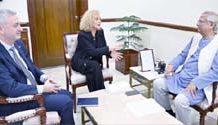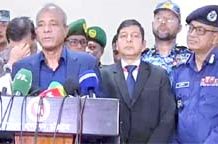C T Online Desk: The Bus Rapid Transit Line-3 Project on the Gazipur–Hazrat Shahjalal International Airport route has become the latest example of irregularities and mismanagement with development projects in Bangladesh.
Not only a recent fatal accident in the project area killed five relatives in a flash at a space with no safety boundary but also exposed a range of other irregularities plaguing the project.
Issues, including the absence of safety boundaries, use of unskilled manpower and expired machinery amid no monitoring, surfaced again after the accident.
The project also met with delays several times, with its cost escalating by more than 110 per cent.
The Dhaka Bus Rapid Transit Company Limited, along with the Roads and Highways Department, Bangladesh Bridge Authority and the Local Government Engineering Department, is implementing the 20.2km north section of the Greater Dhaka Sustainable Urban Transport Project on the Gazipur–Airport route.
Unlike the Mass Rapid Transit Line-6 or the Metro Rail project, there are no boundary walls separating the project areas on the Gazipur–Airport road, one of the busiest roads in the country, which is used by thousands of people daily.
Inside the Dhaka portion, the project ends in the airport area opposite of which the airport railway station is located. Due to the BRT construction work, people using the road everyday have to face untold ordeals in crossing the project area — particularly due to huge traffic congestions which get intensified by the construction materials piled up on the road.
Since the beginning, accidents, often fatal ones, have become common in the project area.
In the latest deadly accident on August 15, five people were killed instantly and two others, all from the same family, were injured when a girder from the project crashed on a car near Jashim Uddin Avenue in Uttara.
A road transport ministry probe body, at work to identify the reasons for the tragedy, primarily held the China Gezhouba Group Company Limited, contractor of a component the of the project under Contract 1, responsible for it.
The Rapid Action Battalion arrested 10 Bangladeshi nationals over the accident and at a press conference on August 18 said that the crane, from which the girder fell on the car, was fitness-expired and being operated by an assistant to the driver at the time of the occurrence.
CGGC safety engineer in Bangladesh Zulfikar Ali’s academic qualification was found to be just a Secondary School Certificate degree, said the RAB.
‘Strict action should be taken against the agencies designated to monitor the project implementation,’ senior urban planner and president of the Institute of Architects Bangladesh Mubasshar Hussein told New Age.
Mubasshar said that the tragedy was not an accident but a ‘murder’ as the incident was not new in the project area.
‘Where in the world do projects have such frequent time and cost overruns and work in such a way?’ Mubasshar asked.
He alleged that this sort of incidents continued to take place due to ‘underhand dealings’ between contractors and government agencies concerned.
Just a month ago, on July 15, a project worker died when a crane fell on him at Chandra Square in Gazipur and about three months earlier, on March 14, six workers, including three Chinese nationals, were injured as a launching girder and a pier cap of the project collapsed at separate sites in the capital.
The BRT Line-3 Project is being implemented under four contracts — Contract 1 is for the grade section under the RHD, Contract 2 for the elevated section under the BBA while Contract 3 for building local roads, drainage systems and markets and Contract 4 for the Gazipur bus depot both are under the LGED.
‘Unfortunately, the project is taking so much time because of unskilled manpower and weaknesses in the management,’ said SM Salehuddin, a transport expert and former executive director of the Dhaka Transport Coordination Board.
Even after the latest mishap, no proper safety measures were put in place to make the project area safe, he noted.
The Dhaka Bus Rapid Transit Company should have regularly monitored the project activities and handled the situation more strictly, he added.
The BRT Line-3 project was approved by the executive committee of the National Economic Council in December 2012 with the project set to be completed by October 2019 at a cost of some Tk 2,000 crore.
The project deadline has so far received four extensions, with March 2023 as the latest target for the completion of the work, while the cost has doubled to Tk 4,263.32crore.
Road transport and bridges minister Obaidul Quader has already announced that the project will be completed by December 2022.
Mahbubul Bari, team leader for project management coordination and capacity building of the Greater Dhaka Sustainable Urban Transport Project, said that the feasibility study for the project commenced in 2012 and the construction work began in the beginning of 2018.
Initially, the project was scheduled to be completed by 2020 but later the project deadline has been extended four times for Contract 1 and three times for Contract 2, especially for shifting of utility services, he said.
‘The overall progress of the project is 80 per cent as of now,’ Bari said on August 23.
An insider of the project said that all the stakeholders — including the Asian Development Bank, one of the donors — were currently in a dilemma to the end that if the work contract with the CGGC was terminated then it would require another international tender call and more time for the project to be completed.
As the contractor has won the deal by lowering the project cost by 22 per cent in an international tender process it has tried to reduce the cost by compromising on safety, he added.
A lack of accountability, transparency and technical knowledge has been the reason for delays in the project work since the very beginning, said Accident Research Institute director Professor Md Hadiuzzaman.
Noting that the CGGC has been selected for the job as it became the lowest bidder, he said that this work could not be carried out by lowering the cost by 22 per cent.
‘The government has later doubled the project cost,’ he said, observing that instead of taking action against the contractor for not completing its work in the stipulated time the government has rather rewarded it by extending the project deadline and doubling the cost.
‘It’s a “win-win situation” for the contractor and the implementing government agencies when a project continues for a long period,’ he remarked.
He went on to say that as almost 80 per cent of the project work was completed, if the authorities now terminated the contract with the contractor they would happily leave as they had pocketed 80 per cent of the project money.
‘If the government tries to engage a new contractor, then the project will face further delays,’ he viewed.
‘This project uses no peripheral boundary like the MRT Line–6 project and the people engaged in the BRT Line-3 project safety management have no concern for safety at all,’ Hadiuzzaman pointed out.
‘In all respects, people are the sufferers in the situation this project has created,’ he said, urging the government to take the contractor to task as per international laws.
Jahangirnagar University’s urban planning department professor Akter Mahmud also said that since the very start there had been no safety measures in the project area, adding that the DBRTCL could not make the contractor follow the safety rules, which was a great weakness on its part, he said.
‘This is an international company and it follows these rules in other countries. Then, why not in Bangladesh? Because the implementing agency did not compel it to follow the rules,’ said Akter, also former president of Bangladesh Institute of Planners.
The government should take up a strong position in order to complete the project work immediately, he added.
DBRTCL managing director Shafiqul Islam told New Age on August 23 that he would not make any comment on the project ‘right now’ as an investigation committee was working.















